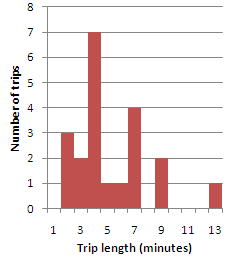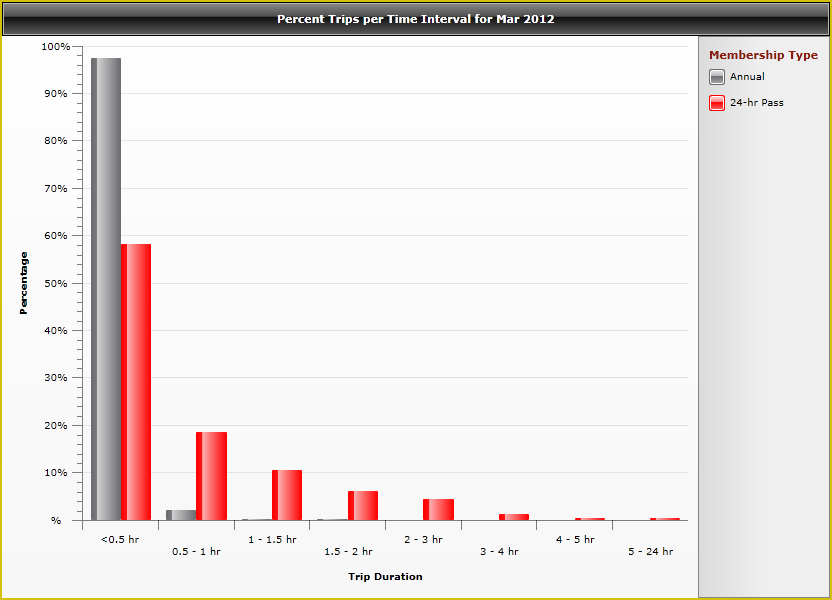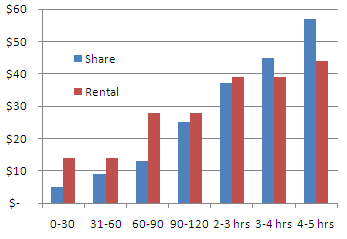For a transportation data junkie like me, one of the great things about bike sharing is that the system lets you log in and see your trips. I’ve been riding Hubway for about a month, and I’ve taken 21 trips. Of these trips, 20 have been ten minutes or less. The one longer trip was 13 minutes. At no time have I gotten even half way to the 30 minute cutoff. Over on the right is a chart of the trips I’ve taken. The frequent four-minute trip is when I jump on a Hubway at Charles and ride it across town to my office, docking it outside the building. It’s faster than taking the T another stop, fighting the crowd at Park Street and either walking the Common or taking the Green Line one stop to Boylston.
This will probably change once Hubway launches in Cambridge, especially if they manage to put a station in the park near my house (not that likely, since it’s a mostly residential area, although it is halfway between Central Square and the grocery stores on the river, so there might be good traffic to those areas; I’ve been lobbying Whole Foods by Twitter to sponsor a rack there). I figure a trip on a Hubway from home to work would take about 16 minutes, so I’d still be well within the limit. And if I were taking a longer trip on a shared bike, I’d probably be cognizant of the time limits and swap a bike in and out at a rack (you just have to dock and undock) to reset the clock and get another half hour. Fifteen seconds of my time is certainly worthwhile to save a few bucks, and most trips are bound to pass by a Hubway rack.
Anyway, bike sharing in New York City is getting readier to launch and there’s a bit of a hoo-rah about how high its marginal hourly rates are. It is worth noting that the 97% of rides which are under 30 minutes in DC, as quoted by this article, (and 99+% are under an hour) are rides for frequent users on a monthly or annual pass. Capital Bikeshare publishes a lot of data (*) on their website (from which the chart below was taken) and the number of trips under an hour, for annual users, is pretty staggering. The number of trips under 2 hours—at which point trip costs really get out of hand, is 99.83%.
The main impact of overage costs are on casual users. For casual users, only slightly more than half of trips are completed within the free half-hour time limit, and 25% of trips are longer than an hour. So these folks pay. This is okay with me, for the most part, since they basically subsidize the riders who pay $50 to $100 and ride the bikes for several months. (If I make 20 trips per month of 8 months, my $50 Hubway fee will divide out to about 30¢ per trip.)
There seem to be two types of casual user (someone buying a single- or multi-day pass). One are people who want to try out the system (or use the system) in a similar manner to a frequent user and understand fully how it works. These folks probably fall mainly within the time limit. The second group are the people using shared bikes in place of rental bikes (which CitiBikes encourages on their website for longer-duration trips). This is basically how carsharing and traditional car rental operate. For a short trip (a few hours) a shared car is most certainly cheaper than a rented one. For a multi-day trip, it’s probably cheaper to go with a rental car. Bicycles, not surprisingly, have shorter trip times, and more disparity between low-cost (or no-cost) shorter trips and quite expensive long ones.
And rental bikes aren’t that cheap. The first hour is $14. Half a day is $39. These rates are more expensive than bike sharing for the first 90 minutes, on par from one-and-a-half to three hours, and cheaper beyond that. So if you want to rent a bicycle to roll around Manhattan all day, bike sharing probably isn’t for you. But take a look at the number of trips in DC longer than two hours. It’s only about 5% (and casual users only account for 1/6th of all trips). So the number of users dinged for particularly long trips is rather small.
There’s obviously a learning curve to the pricing scheme, and a number of Yelpers in Boston have apparently not understood it (although, frankly, it’s not that hard to understand). Apparently Hubway could do a better job of communicating this, and maybe CitiBikes should as well. What I really am surprised by is how someone would take bike with no lock and keep it out in a city for five or six hours! It’s not like they’re riding a century on it. I’d have to assume that even an oblivious tourist would get scared off by Boston traffic after a while, or run out of room on the Charles River paths and make for a cafe or museum. And in New York, where most any bicycle parked anywhere is asking to be stolen, having a rental bike is a liability. With a shared bike, all you have to do is find the nearest dock and leave the bike there. No lock required. With well-placed kiosks, this should be relatively easy.
What will be interesting is how this affects revenue from casual users (looking at the data from DC, I doubt that more than a handful of frequent users will ever pay an overage fee). While casual users do not account for much of the ridership, they do provide a good income stream. It’s possible that the higher rental costs will drive away prospective users. Even with higher prices, the drop in ridership will result in less revenue from casual ridership.
However, we’re talking about New York. There are a lot of potential casual riders (tourists), so it might be good to have higher prices as a bit of a barrier to entry to keep casual users from usurping the transportation demand aspect of bike sharing. And New York tourists don’t seem particularly price sensitive. Visitors to the City are paying $300 a night for a hotel room, $150 for tickets to a show and $40 for a pre-show meal at a mediocre Times Square restaurant. At those rates, what is another $25 to ride a bike around Central Park for a couple of hours? The higher rates—especially for casual users—strike me as a good balance between keeping bikes in the system available and maximizing revenue.
* CaBi has CSV files with every trip taken, too. I’m drooling.



